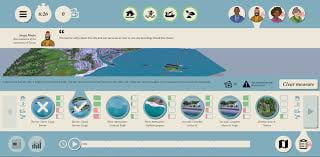Applied Immersive Games for Situated Learning on Planet Earth
Heide Lukosch, HIT Lab NZ, University of Canterbury
It’s difficult to teach the immense complexity of natural and societal relationships from a confined classroom. Field trips are a valuable and valued method enabling students to engage with real-world situations, and to explore natural and social phenomena.
But what if field trips are not possible?
Specifically, how do we provide that experience when students can’t travel, or the natural phenomenon under study is too dangerous to explore in real life? To cover this gap, applied immersive games create engaging and safe environments to experiment and learn. They produce immersion as they are based on rich virtual experiences, meaningful stories, and ways to interact with the virtual environment. They motivate students as they include engaging game elements, and provide situated learning experiences, that start from real situations.

Applied games are based on realistic models of real-world situations and events, and provide immediate feedback on decisions and actions of players. Players can walk through scenarios, take over roles and explore the consequences of certain actions and decisions to change the course of events. These scenarios can be used to develop and test future alternatives before implementing them in the real world. Applied games can for example simulate an earthquake, and resulting tsunami, and challenge students to explore the best evacuation routes. Games can illustrate the consequences of flood prevention measures on different locations, and on different stakeholders. Many disciplines and perspectives can inform the design of such games – different scientific disciplines as well as Western and indigenous knowledge on how to approach natural and societal challenges.
Applied immersive games are one means to learn about planet earth in an integrated and engaging way – in addition to actual field trips, engaging and simulated experiences are used in LEAF for future earth AKO learning.
More on her research here:
https://www.youtube.com/watch?v=jipVPmV9Nig&list=PL1D0DE06F56864BA4&index=2&t=46s
